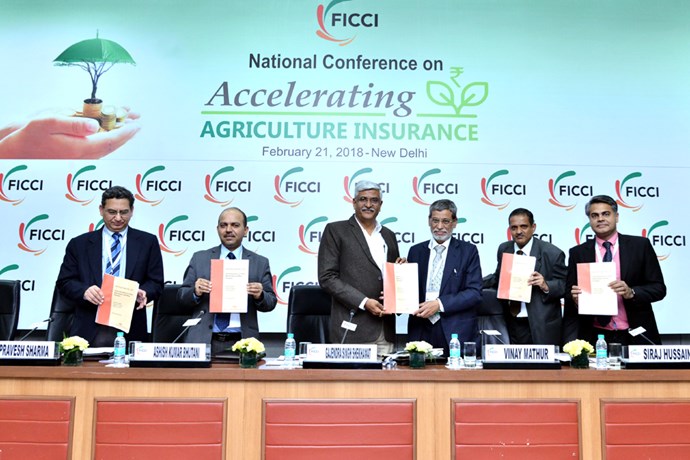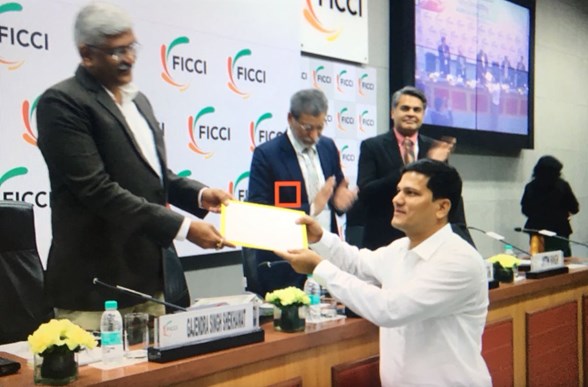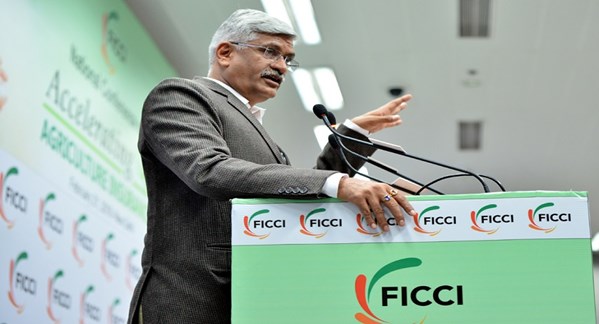 Lack of cooperation of the State Governments was posing a huge challenge in the implementation of the Pradhan Mantri Fasal Bima Yojana (PMFBY) which was conceived by the Government to provide comprehensive agriculture insurance in the country. While inaugurating the National conference on ‘Accelerating Agriculture Insurance’, organised by the Federation of Indian Chambers of Commerce and Industry (FICCI), The Hon`ble Minister of State for Agriculture & Farmers Welfare Shri Gajendra Singh Shekhawat opined and further added that agriculture being a state subject, the states would have to come on board to iron out the glitches in the implementation of the scheme. He advised FICCI to conduct brainstorming sessions on the subject in the states and come forward with recommendations on ways to bring the laggard states on a par with good performers to derive the full potential benefits of the scheme.
Lack of cooperation of the State Governments was posing a huge challenge in the implementation of the Pradhan Mantri Fasal Bima Yojana (PMFBY) which was conceived by the Government to provide comprehensive agriculture insurance in the country. While inaugurating the National conference on ‘Accelerating Agriculture Insurance’, organised by the Federation of Indian Chambers of Commerce and Industry (FICCI), The Hon`ble Minister of State for Agriculture & Farmers Welfare Shri Gajendra Singh Shekhawat opined and further added that agriculture being a state subject, the states would have to come on board to iron out the glitches in the implementation of the scheme. He advised FICCI to conduct brainstorming sessions on the subject in the states and come forward with recommendations on ways to bring the laggard states on a par with good performers to derive the full potential benefits of the scheme.
On the occasion, the Minister also released a FICCI - Skymet Knowledge Paper titled ‘Accelerating Agriculture Insurance’ and an ICRIER working paper on ‘Crop Insurance in India: Key Issues and Way Forward’.
As the Indian Monsoon has a direct relationship with the global climate change, which is evidently showing impact across the country in forms like the early and the late arrival of monsoon, temporal fluctuation in the onset of seasons, unprecedented rainfall and associated phenomena. Huge variations in the climatic conditions make it challenging to tackle the menace of climate change especially related to key environmental parameters such as temperature and rainfall.
There has been growing consensus among climatologists that global temperatures and precipitation patterns are changing. The last three decades have seen a gradual drop in the quantum of precipitation during the monsoon. The remarkable increase in temperatures and decrease in the amount of rainfall has already started hampering crop production in the country. In addition to this, the number of rainy days has also reduced the rainfall averages remaining the same, thereby causing uncertainties.

The National Conference sought to provide a platform for a candid dialogue between state governments, the private sector as well as farmer representatives on the present agriculture insurance policies, and how PMFBY is expected to unfold in future.
The Minister said that the crop insurance scheme seeks to provide umbrella insurance coverage to the farmers from sowing to harvesting and for the first time the farmers had realized its benefits, buffeted as they are with uncertainties of the market and weather conditions.
PMFBY was launched from Kharif 2016 by the Government of India and is built on the lines of ‘One Nation - One Scheme’ theme. The scheme is more farmer-friendly in comparison to earlier versions with simplified provisions and reduced premium. The farmers premium has been reduced for all food and oilseeds crops and kept at a maximum of 1.5 percent for Rabi, 2 percent for Kharif and 5 percent for annual horticultural/commercial crops. This has resulted in increase in coverage of area and crops.
On this occasion Shri Ashish Kumar Bhutani, Joint Secretary, Ministry of Agriculture and Farmers Welfare, pointed out that while the PMFBY had resulted in a 74 percent increase in the sum insured in 2016-17 and coverage under the scheme had risen to 50 percent of the gross cropped area, a number of challenges still remained in its implementation.

For instance, many states were unable to conduct crop cutting experiments, there was lack of historical data on the insured which was jacking up premium, thereby impinging on the resources of the Centre and the states and there was delay in the release of subsidy by states. He said that it was also imperative to evolve a focused and structured dispute resolution mechanism in this regard.
Shri Bhutani said that with a view to implementing the scheme end-to-end, the Centre had created a new portal which would be online in the next seven to eight days. The portal would act as a platform for addressing all relevant issues, including processing of claims and delay in the provision of subsidy by states. Alongside, the Central team to oversee and monitor the scheme was being strengthened.
The Skymet Knowledge Paper further added that Another impact of climate change hampering the crop production is the increasing incidents of El Niño and La Niña, which have been having a direct impact on the monsoonal precipitation. El Niño has been proven to have influenced global temperatures besides global warming. The worst part about both these phenomenon is that their earliest indication comes very late.
In recent years, the erratic and unpredictable behavior of monsoon, accentuated by climate change has caused extensive financial losses in terms of crop failures, damage to agricultural infrastructures, loss of lives and properties etc. due to natural and manmade disasters and destruction to environment and farmlands. This has aggravated food insecurity in the country.
The paper states that in order to combat this challenge, there is need to adopt a strategy which may provide a comprehensive solution to farming communities for safeguarding agricultural productivity. Crop Insurance is one such area which is gaining momentum in the contemporary scenario. This is considered as the best option to transfer the cost of potential losses due to disaster or emergency situations. By adopting crop insurance, farmers can also leverage technology & data analysis to monitor, manage, and reduce the impact of those risks.
The Government has taken several initiatives for the overall sustainable development of farmers and cultivators to protect livelihoods and to enhance their agricultural productivity. These may enhance credit flow to farmers and expand the area of crop insurance and irrigation coverage specifically in the era of changing the climate.
PMFBY is one such initiative of crop insurance launched by the Government of India, which is a comprehensive scheme of insurance coverage against crop failures. The Government aims to provide crop insurance for PMFBY to 50 percent of the total cropped area during 2018-19.
Digital revolution is a well-established concept among the contemporary agricultural communities. Technology has always been an integral part of agriculture, which has been highly successful in intriguing farmers towards better farming practices and thereby to crop insurance. Even one of the significant highlights of PMFBY is to adopt the modern technological innovations.
Agriculture is a highly localized activity and therefore, information must be tailored to specific conditions. Thus, staying abreast with the modern technological innovations like digital sensor-based weather forecasting, GIS-based crop estimation, Drone-based surveillance etc. can maximize the benefits of crop insurance scheme for farmers as well as agricultural output.

Technology interventions play a significant role in agri-risk insurance in the country. The prospective areas where these interventions can inculcate a new culture of development and resilience at all levels are Insurance coverage, Sowing risk, Crop mapping, Price fixing, Localized risk coverage, Crop cutting experiment, Crop failure and damage assessment and Disaster risk management.
Weather-based Crop Insurance Scheme is also a remarkable insurance solution that is greatly contributing to promote digital revolution in the agriculture sector. This provides protection against crops and agri- losses resulting from the weather adversities. In this scheme, the crop losses are assessed on the basis of actual weather data received from the approved automatic weather stations installed at pre-defined places in different locations. Major weather risks arising out of parameters like rainfall, relative humidity, temperature, wind etc. are covered under the ambit of this scheme.
With the gaining momentum of technological interventions in the agricultural sector, the risk related to agriculture has also increased exponentially. Thus, there is a need to adopt a well-structured strategy to combat the emerging challenge of agri-risk in the country.
Chander Mohan
Krishi Jagran










